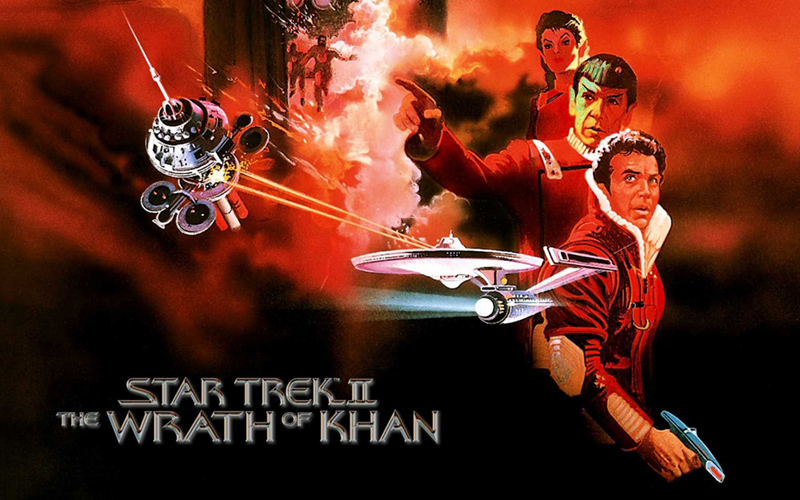Retro Review: Star Trek II: The Wrath of Khan
8 min readWhen a Starfleet vessel accidentally finds Khan, who was stranded on Ceti Alpha V decades before by Captain James T. Kirk, the former tyrant steals the ship and comes seeking vengeance.
Plot Summary: A grumpy, aging Admiral Kirk is testing cadets at Starfleet Academy who have studied under Captain Spock, whose protegee Saavik and many other trainees arrive on the Enterprise for routine exercises. The ship receives an emergency transmission from Kirk’s onetime lover, Dr. Carol Marcus, who has been working with her son David on a project called Genesis, a scientific program that reorders matter at a subatomic level – creating life on lifeless worlds, including the laboratory Regula I where she has been working. But the starship Reliant has contacted the Marcuses to tell them that Starfleet will be taking over the project, and Marcus believes that Starfleet intends to use it as a weapon. Unknown to both Kirk and Marcus, the Reliant’s senior crew members have been compromised, for while looking for a test planet for Project Genesis, they discovered Kirk’s old nemesis Khan Noonien Singh, a genetically advanced tyrant bent on revenge upon Kirk for his exile and his wife’s death. Khan now controls the minds of Captain Terrell and Commander Chekov, and has learned from them of the existence of Genesis. When Kirk and his trainees arrive at Regula I to follow up on Carol Marcus’s plea, Reliant fires on Enterprise, severely damaging the ship before Kirk is able to retaliate. On the space station, he finds most of the scientists murdered, though Carol and David – and Genesis – are missing. Terrell and Chekov have been left on the station by Khan.
Following Regula I’s transporter signals, Kirk tracks the Marcuses to a cave deep within the planet below, where David attacks Kirk, forcing Carol to admit to her son something Kirk already knows: that he is David’s father. Kirk claims to have had nothing to do with Starfleet’s taking control of Genesis, at which point Terrell contacts Khan to reveal the location of the delivery torpedo. Khan beams Genesis away, though Terrell manages to resist his order to kill Kirk, turning his phaser on himself instead. Khan departs with Genesis, though Kirk knows Khan will have to repair Reliant before he goes far. He stalls for time, allowing Khan to believe he has been marooned, letting the Marcuses show him their work on Genesis underground. Soon afterward, he reveals that he has not lost contact with Spock, who beams them aboard the Enterprise. Because the ship is still damaged, Kirk orders it into the Mutara Nebula, knowing that Khan will follow but his ship’s sensors and shields will be useless. The Enterprise is able to navigate behind Reliant and destroy its engines, but rather than accept defeat, Khan arms the Genesis torpedo. Because the Enterprise cannot go to warp speed until someone can enter the radiation-flooded control center in Engineering, Spock bypasses the safety controls and repairs the ship himself, knowing he will suffer fatal radiation poisoning. The Enterprise’s warp engines come back online just before the Genesis torpedo explodes, and the ship escapes while the nebula and the Reliant are transformed into a new solar system. McCoy calls Kirk to engineering, where Spock tells him not to mourn, but after Spock’s death, all the senior crewmembers are devastated at the funeral. David tells Kirk that he is proud to be his son, and the torpedo tube containing Spock’s body is launched to the newly forming Genesis planet.
Analysis: Although I’ve loved this movie for more than half my life, this is the hardest review I’ve ever had to write. (I’m tempted to do what my son does when things are infuriating – something he picked up from myself and his father long before he’d seen the film – and simply type, “KHAAAAAANNNNN!”) Star Trek II: The Wrath of Khan is the most-admired by far of the films by all the serious Trekkers I know, and if there was a time when it wasn’t the best-loved, because of the tragic ending, that has been erased by the reversal of that tragedy in the subsequent films. I believe this is the first time I’ve watched The Wrath of Khan since receiving canonical proof that Spock will, in fact, outlive Kirk (well, not that the filmmakers couldn’t reverse that – Spock was the first for me of a long line of magical un-deaths that I’ve since learned to resent, but more on that next week). In fact, when I think of tragedy associated with this movie now, the first thing that comes to mind is the death of Merritt Butrick – who played David – of AIDS before his 30th birthday.
So many elements from The Wrath of Khan have entered popular culture apart from Kirk’s epic shout from the bowels of Regula that I’m tempted to link to the TVTropes page rather than try to cite them all. I even left a lot of them out of the summary above: the Kobayashi Maru test, which has become synonymous with a no-win situation; McCoy’s wry declaration, “I only use it for medicinal purposes” when handing Kirk a bottle of illegal Romulan ale; Carol Marcus’s equally wry “Jim Kirk was never a Boy Scout”; Kirk’s gloating “I’m laughing at the superior intellect”; and Spock’s use of a Vulcan aphorism, “The needs of the many outweigh the needs of the few or the one,” which my kids had thought was from the Bible or Aristotle and were a bit horrified to learn that it originated with the fictional philosopher Surak. Then there’s the phenomenon that TVTropes calls Ham to Ham Combat, in which two actors of epic stature try to overact each other; it’s extremely rare that someone can outdo William Shatner in the scenery-chewing department, but Ricardo Montalban does it with such relish, mashing up lines from Moby Dick with astronomical phenomena and made-up places, intoning things like, “Kirk, my old friend, do you know the Klingon proverb that tells us revenge is a dish that is best served cold? It is very cold in space.” Only Darth Vader’s “Apology accepted, Captain Needa” can compete with that gleeful malevolence.
This isn’t the best of the films in terms of ensemble work – Sulu and Uhura in particular get shortchanged to give screen time to Saavik (unforgettably played by Kirstie Alley, whose subsequent departure from the franchise dealt a serious blow to the sequel), and although Scotty gets a memorable tearful scene with a dying cadet, the theatrical cut of the film loses the explanation that the boy was his nephew. Chekov, at least, seems to have gained a career outside Kirk’s orbit, although the scene in which Khan claims to recognize his face is legendary because Chekov wasn’t on the Enterprise (or, at least, Walter Koenig wasn’t on the show) at the time of “Space Seed,” the episode that introduced Khan to the universe. McCoy, at least, is much more recognizable than in The Motion Picture, giving Kirk more practical advice and sharpening his familiar barbs “Get back your command before you really do grow old.” “You green-blooded, inhuman…”), plus he’s the one to whom Spock entrusts his soul, which is a lovely moment even here where we’re not entirely sure what that mind-meld is all about, even if it might just be saying goodbye. I’m very fond of the kindler, gentler Spock of this film, the one who smiles every time he says “Jim” and is such a lovely mentor to Saavik (“nobody’s perfect”), though I can’t be the only one for whom that was almost ruined by the thankfully non-canonical Pocket Books that turned them into a couple later.
This is a really well-timed movie in terms of pacing – there’s a bit of extraneous matter, a shuttle docking sequence swiped from the first movie, attention to the cadets when one might wish the story would get moving already, but nothing that weighs down the film the way its predecessor nearly collapses under the weight of its visuals. The sequences that introduce us to the Marcuses and very quickly convince us that they’re worthy to be Kirk’s onetime lover and son are simply excellent: witty dialogue, lots of passion about their work, and that wonderful briefing about Project Genesis, which Carol Marcus narrates over visuals of a transformed planet that still look good two decades later. Shatner gives perhaps his most subtle performance in the franchise – he’s convincingly old, cranky, and unnerved at the beginning, then on top of his game when he takes command, and ultimately devastating facing Spock’s loss – but the movie itself really comes alive when Montalban’s Khan appears, stealing every scene he’s in, never quite so malevolent that we don’t root for him a bit. His grievances are legitimate, though I’d think his complaint would be with all of Starfleet, not just Kirk. We never get any sort of explanation for his motley crew, all of whom are too young to have been the supermen and women originally stranded with him yet few of whom seem young enough to be their offspring, but it’s not hard to believe that they’d follow him anywhere, even the more rational Joachim, whose dying words pay tribute to Khan’s superior intellect.
Yet it’s also a really tight movie thematically, beginning with Saavik passing-by-failing the Kobayashi Maru test – she chooses the dangerous rescue, of course, and gets her entire crew killed, rather than choosing to save her ship and ignore the distress call, which I imagine wouldn’t sit well with Kirk or Spock, the needs of the many notwithstanding. She can’t let it go, however, repeatedly asking Kirk how he beat the no-win scenario, until he finally admits that he reprogrammed the simulation…as David snorts, “He cheated.” (Takes one to know one, we can all say in retrospect, though everyone is very glad Kirk and Spock cheated by lying, excuse me, exaggerating, to hide their timetable from Khan.) That sort of cheating is the M.O. of the Captain Kirk we all loved from the original series, and Spock and McCoy always warned him that there would be consequences, but Kirk has led a charmed life. When the Enterprise comes to life as the torpedo explodes, his first reaction is to thank Scotty’s reputation as a miracle worker rather than to wonder about the cost. Of course he won’t be able to let Spock’s death go, not only because Spock is his best friend and he loves him, but because he blames himself for the loss. Spock claims his decision to enter the irradiated chamber as his own personal Kobayashi Maru test, but it’s Kirk left facing the consequences of the no-win scenario until the sequel to this movie engages in the greatest cheat of all. I don’t know whether to say “there are always possibilities” or kling akhlami buhfik about that.






